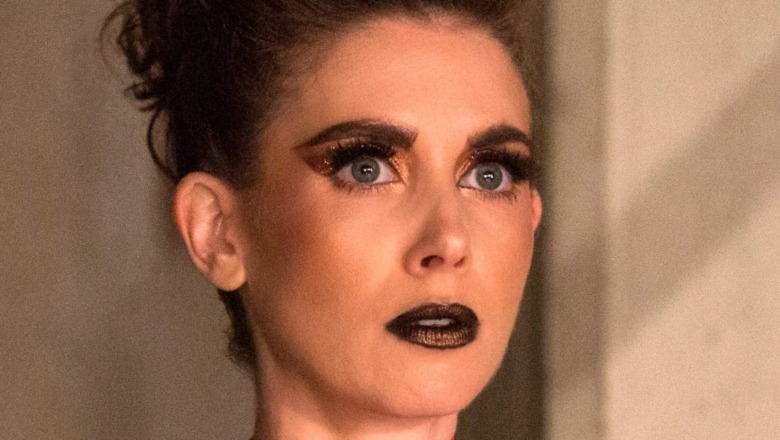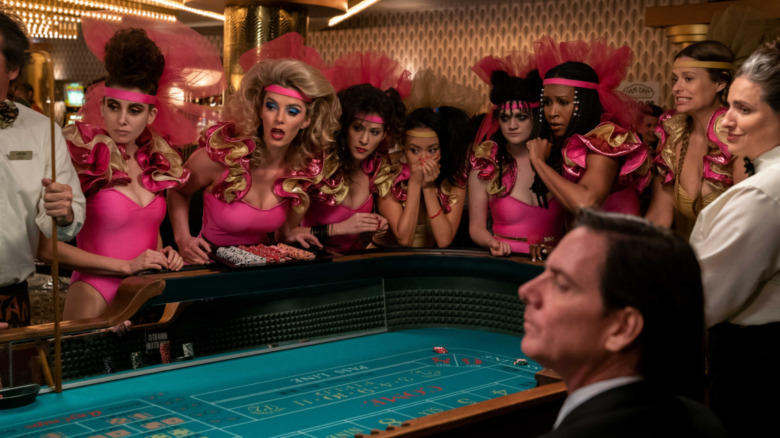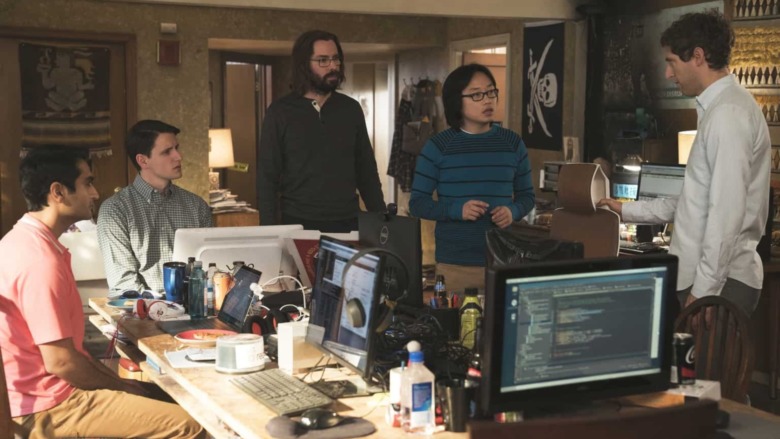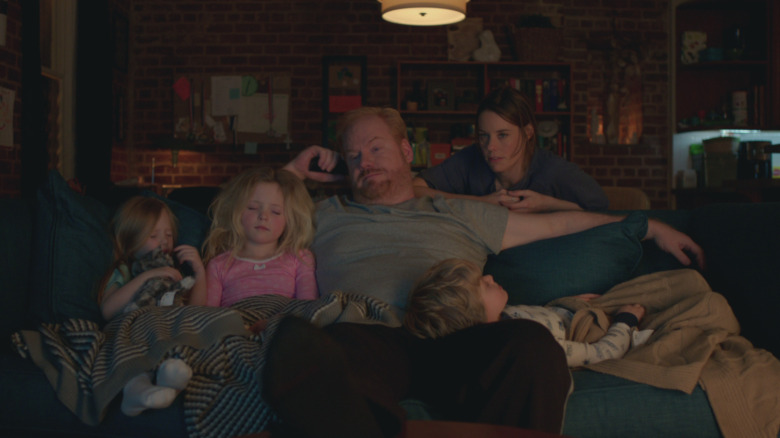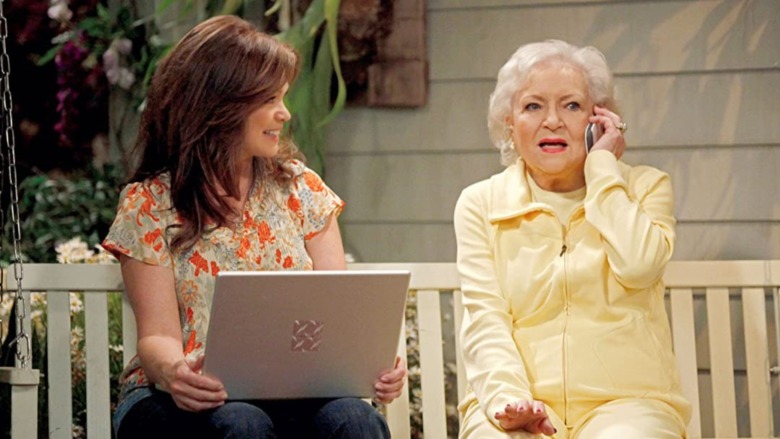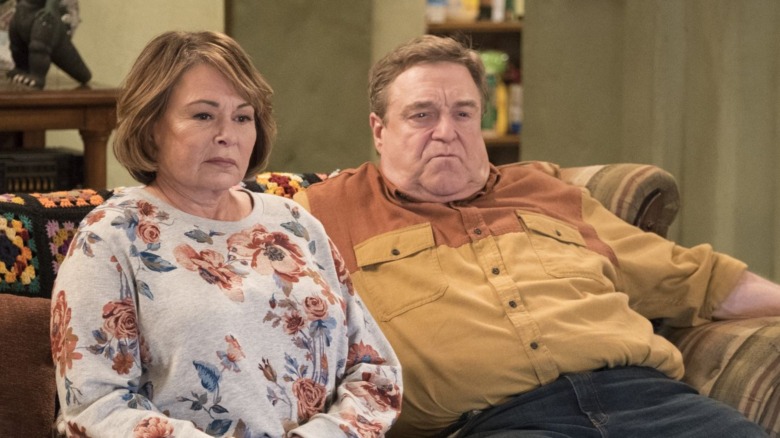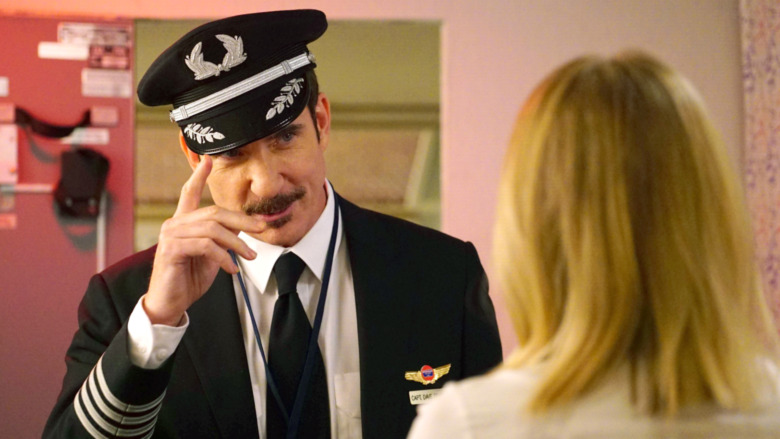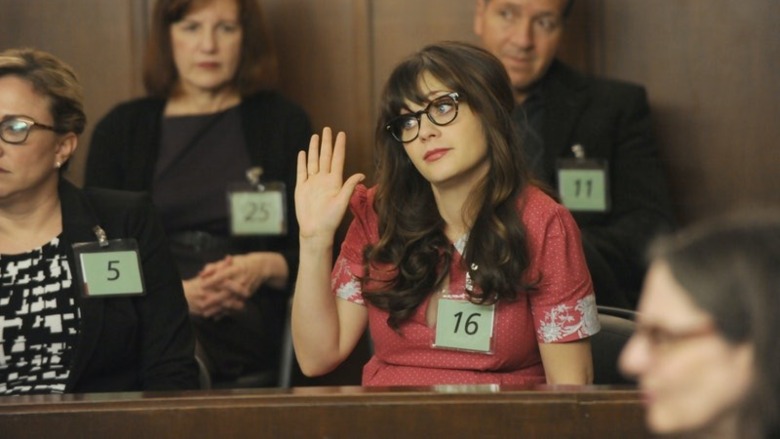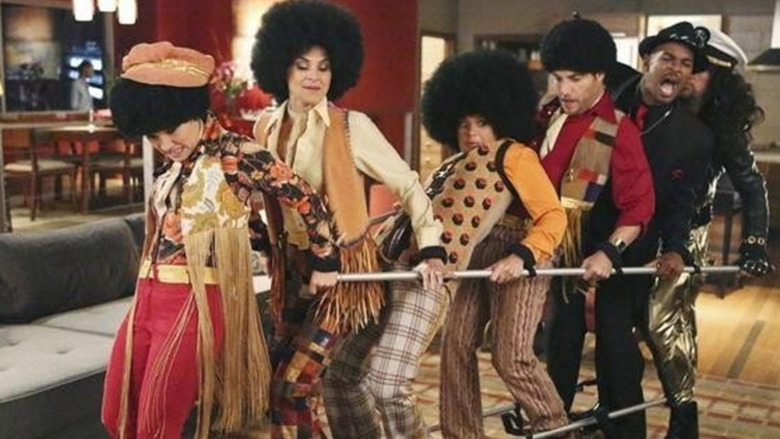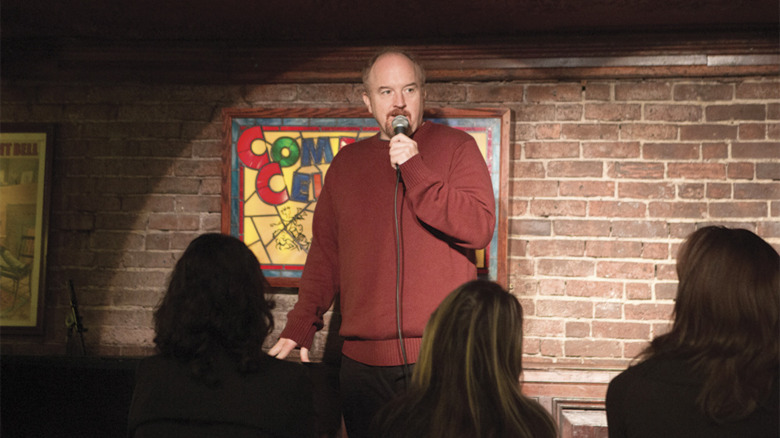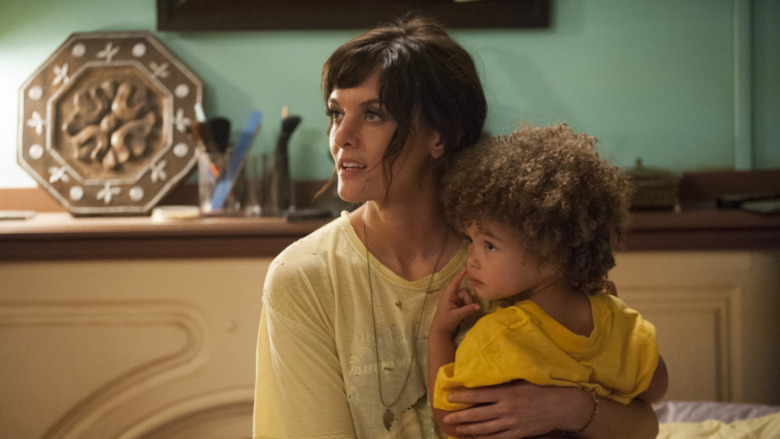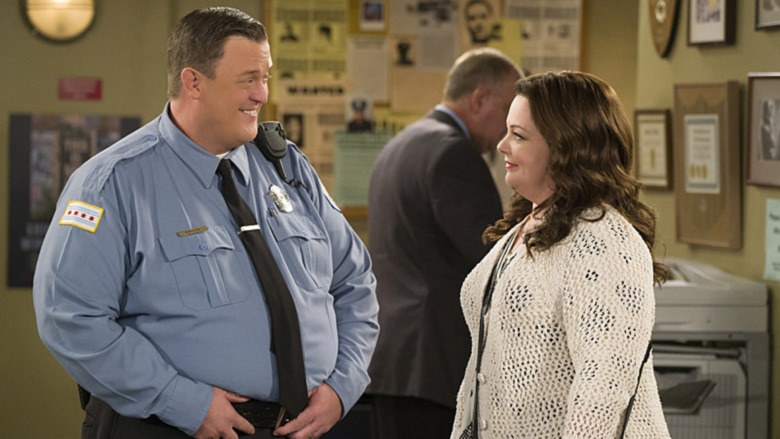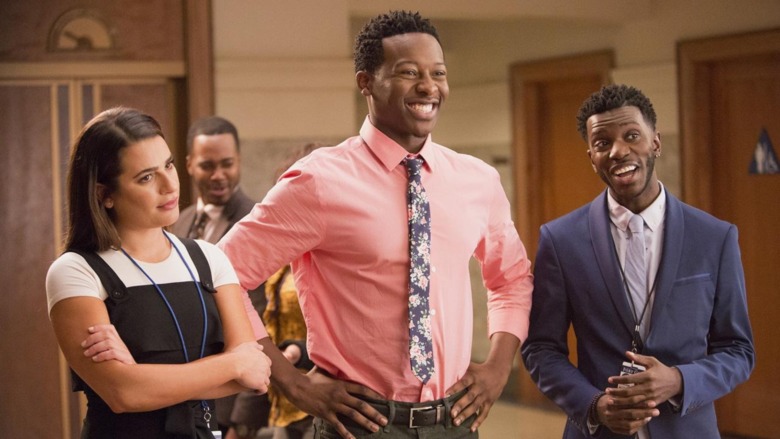The Real Reason These 2010s Sitcoms Were Canceled
You never forget the television shows you love, but the ones that get mysteriously canceled hold a special place in the heart. What cut these programs down in their prime? Why did things end so abruptly? Was there behind-the-scenes tension? Did scheduling trip things up? Was there simply not enough money to go around? Lacking these answers can haunt a fan for decades. In the past, sitcoms that met untimely ends often remained inscrutable mysteries — without the internet, where fellow fans are always dissecting the pasts, presents, and futures of their favorite shows, circumstances could be opaque for years.
But in the modern era, a fan can hope for answers. The internet is omnipresent, which means more information is readily available than ever before. We have precise documentation for why modern shows end without ever needing to break out the microfilm. In that spirit, we're here to investigate why these beloved sitcoms of the 2010s met their ends.
GLOW
COVID-19 delayed the production of many projects, but none were as primed for pathogenic disaster as Netflix wrestling dramedy GLOW. Contact sports that induce heavy breathing are less-than-ideal during a pandemic, for one thing. The show was also shot in Los Angeles, a city hit particularly hard by the virus. Tack on a large ensemble cast and a high budget, and Netflix had a show with no clear path back to safe production carrying a ballooning price tag.
All this led to Netflix canceling GLOW in October 2020. Production had gone on for a few weeks, and an episode was in the can when the shutdown started, but the circumstances were simply too dire to continue. As creators Liz Flahive and Carly Mensch told Deadline, "COVID has killed actual humans. It's a national tragedy and should be our focus. COVID also apparently took down our show."
Shortly after the cancelation, star Marc Maron proposed that Netflix could solve production issues and wrap up the show's stories with a feature-length movie. The entire cast held a Zoom reunion later that week, during which they unanimously agreed they'd be on board for a movie. Even so, Alison Brie — who has spent years trying to get a Community movie off the ground — urged caution during an interview with The Fourth Wall podcast, saying, "don't hold your breath because if it does happen, it might take a minute."
Silicon Valley
In an interview with The Hollywood Reporter, Alec Berg and Mike Judge were asked why they ended the show where they did. Berg called it a "very complicated question," but laid out his reasoning. First, Berg was influenced by Jerry Seinfeld's decision to turn down a huge payday, rather than dilute his show. Judge agreed, saying he was worried about the show getting repetitive: "It just felt like we can only have them keep failing for so long without it getting old."
There was also a darker reason behind the show's end: The tech world had taken a sinister turn. "When we started out," Judge said, "it was absurd in more of a funny way, seeing these young programmers and tech types suddenly becoming billionaires so quickly. But it has gotten a little more serious now. Facebook's motto back then was 'move fast and break things,' and it's a little less cute now that they actually have moved fast and broken things." Berg concurred, saying, "You get to this place where people are making very sustainable arguments that Facebook and Twitter and these other companies have torn the fabric of society irreparably ... And it ceases to just become a goofy, fun little show."
The Jim Gaffigan Show
It's a small wonder that it took Jim Gaffigan, one of the most popular comedians in America, until 2015 to get a sitcom, but television will probably always be weird like that. Based on his life raising five kids in a cramped New York City apartment, The Jim Gaffigan Show ran on TV Land for two seasons, from 2015 to 2016.
In the lead-up to the season two finale, however, Gaffigan surprised fans by releasing a major statement: The season finale would double as a series finale. Gaffigan thanked the cast, crew, and TV Land profusely, but claimed that "the time commitment to make the quality of show we wanted was taking us away from our most important project, our five children." TV Land released a statement of their own, corroborating Gaffigan's account: "After two great seasons, we have mutually agreed to not move forward with season three of the series."
Hot in Cleveland
Produced at the height of the early 2010s' Betty White mania, Hot In Cleveland was TV Land's first attempt at an original series. The multi-camera sitcom, in which three middle-aged entertainment industry veterans move from Los Angeles to Cleveland, is something of a 21st-century Golden Girls. It sported a solid cast and good ratings for most of its run.
Despite series creator Suzanne Martin saying on the record that she wanted to do at least eight seasons, Hot In Cleveland was canceled during production of season six in 2014. The show ended with 128 episodes, more than enough for rerun syndication, but the end was still a shock to fans — and especially the cast. No reason was given at the time, but star Valerie Bertinelli told the AP in 2015 that TV Land canceled the show "because they wanted to put on younger shows." Indeed, by 2016, TV Land had axed all of their original multi-camera sitcoms and put all their eggs in the "younger viewers prefer single-camera shows" basket.
Bertinelli still strongly disagrees with this decision, saying in 2019, "I think it was the stupidest thing [TV Land] ever did."
Roseanne
The 2010s saw a spate of sitcom revivals, including Murphy Brown, Will & Grace, an abortive attempt at rebooting Coach, and Roseanne. That last one had the highest risk/reward ratio: The popular series' chaotic final seasons gave it potential, but Roseanne Barr had graduated from a mildly controversial comedian into a far-right conspiracy theorist. It was a risk ABC was willing to take, and it paid dividends at first: Ratings were great, and it was quickly renewed for another season. Not long after, however, Barr's own behavior got the show canceled.
A mere month and a half after the show got renewed, Barr tweeted a racist comment about former Obama advisor Valerie Jarrett. ABC Entertainment president Channing Dungey responded by calling the tweet "abhorrent, repugnant and inconsistent with our values," and immediately canceled the show. Barr scrambled to make amends, even blaming the tweet on Ambien. Ambien manufacturer Sanofi responded, "racism is not a known side effect of any Sanofi medication."
Yet even with Barr gone and Roseanne canceled, the network still found a way to work things out. The show was continued as The Conners, which follows the rest of the family after Roseanne dies off-screen of an opioid overdose.
LA to Vegas
Produced by comedy icons Will Ferrell and Adam McKay, LA to Vegas was a sitcom about the crew and customers of a budget airline that ferries people between the titular two cities for weekend getaways. It featured an ensemble of established actors like Dylan McDermott, up-and-comers like Kim Matula, and hot properties like Ed Weeks. If it doesn't sound all that familiar, it's because it only lasted one season.
LA to Vegas started out as one of Fox's biggest Tuesday hits, but ended the season on the bubble. Deadline reported that the show's producers were working to "find a way to make noise" for season two, lest they face cancelation — they allegedly tried to book Ferrell for an appearance in the season two opener. Alas, Deadline confirmed a week later that the show was axed after one season. Part of the reason why might have been that Ferrell wouldn't commit to the season opener guest spot, but a bigger part lay with Fox's new big acquisition: Thursday Night Football. This meant fewer spots were available on Fox's schedule, and LA to Vegas being on the bubble meant it was ripe to get cut.
New Girl
Few 2010s sitcoms picked up the loyal following New Girl did, which made it all the more shocking when it reportedly got canceled after six seasons. The exact reason why is a bit hazy — Variety cited lower viewership, while Deadline mentioned logistical issues like Zooey Deschanel's maternity leave making it difficult for the main cast to return for work until the fall. Regardless, Fox was apparently ready to bring down the axe, only for the series to gain a last-minute renewal for a shortened seventh season. According to star Jake Johnson, Fox did, in fact, briefly cancel the show, even if that's not the word he'd use.
During a virtual Q&A for Washington State University, Johnson said, "We didn't quit. They fired us. Everybody uses cool terms like 'canceled' or 'creatively moving on.' That was a job that we had that we all liked having, and then we got the call that they fired us." Series creator Liz Meriwether encouraged the cast to reach out to Fox management to plead their case. Johnson stated that he and Deschanel wrote to then-chairperson Dana Walden and explained how the fans deserved a proper send-off for the characters. It clearly worked.
Happy Endings
Happy Endings might have been the first "canceled-too-soon" sitcom of the 2010s. The show had a solid following, good critical notices, a great cast, and — for a time — solid ratings. It even had a plum time slot: Wednesday nights following mega-hit Modern Family. Even so, it lost about 40 percent of Modern Family's viewership, and ABC started shifting Happy Endings around the schedule. This led to low ratings, which led to cancelation, and somehow, we're only at the halfway point of this story.
Towards the end of the show's run in Spring 2013, when cancelation was imminent, Sony TV (which produced the show) started shopping around for a new home. USA was the main suitor for a period of time, but the deal fell apart when it became clear how much money the network would have to spend to promote a show axed after bad ratings. Happy Endings finally died in June 2013, after the cast's options expired before they could find a new home.
There have been several attempts to revive the show since, which star Casey Wilson told Variety kept falling apart because the actors are on different deals. Even without a revival, there have been two live reading reunions since the show was axed: One of a supposed "lost episode" at EW PopFest in 2016, and one of a new script entitled "And The Pandemmy Goes To..." as part of a fundraiser in July 2020.
Louie
Louie was one of the most acclaimed comedy series of the past quarter century. Fittingly, the show's cancellation and the fall of its star was also one of the biggest and most consequential entertainment industry stories of the last few years.
Louis C.K. wasn't just the star of the show, he was the show: He directed, wrote, produced, and even edited almost every episode himself. All the while, he was also one of the most prolific and powerful stand-up comedians in the world. Even so, whispers followed the star for years, and were finally confirmed after multiple women told the New York Times about his long history of misconduct. Dave Becky, his manager and co-producer on Louie, was also accused of covering up his client's behavior.
Louis C.K. later admitted that all the accusations were true. FX almost immediately ended their business partnership with Pig Newton, C.K.'s production company. This meant that Louie, already on a hiatus when his chickens came home to roost, was effectively canceled, and there's been no talk about reviving the show anywhere else.
SMILF
SMILF, a show following a broke single mother in Boston, was the brainchild of star Frankie Shaw. Indeed, Shaw was the heart of the show — but that fact ultimately resulted in SMILF's cancelation under a cloud of controversy.
Between the first and second seasons, The Hollywood Reporter broke a big story: Shaw was under investigation for workplace misconduct. There were multiple complaints about abusive behavior on set, the most eye-catching of which alleged love scenes scenes so badly mishandled that an actress claimed breach of contract and quit. One anonymous staffer said that "[Shaw] uses this idea of being feminist and a progressive as camouflage," while another called production a traumatizing experience.
The big public turning point happened when local Massachusetts politicians threatened to yank the show's tax credits until the investigation was over. Showtime canceled SMILF mid-season, aired the remaining episodes, and suspended their deal with Shaw. A year later, the studio cleared Shaw of wrongdoing after an internal investigation, and paid her the balance of her contract.
Mike & Molly
To understand why Mike & Molly was canceled, we're going to have to briefly dive into network business practices. When a network picks up a show from an outside studio, there's usually a six year license fee deal between the two pirates. This is likely because five or six seasons of 20-odd shows are enough to produce the preferred 100+ episodes for rerun syndication. After this six year pact is over, the network and studio have to negotiate a new deal for potential further seasons, after which the network negotiates new contracts for the actors.
By 2015, Mike & Molly was in that all-important sixth year. Warner Bros TV apparently expressed interest in a new season, but CBS shut down talks. Deadline reported that some parties involved were worried that the talent, especially Melissa McCarthy, wouldn't re-up their contracts. Plus, shows that go on longer often incur higher costs in general. The cost of an outside studio was also likely a factor. Showrunner Chuck Lorre told his cast the show wasn't renewed, and several stars expressed shock publicly — including McCarthy, who tweeted that "she would have shot this show for 50 more years." The cancelation was confirmed a few weeks later.
The Mayor
On paper, The Mayor had a lot going for it: A solid cast including Lea Michele and Yvette Nicole Brown, a talented writing staff headed by Jeremy Bronson (the man behind Jimmy Fallon's Thank You Notes), and a production team including Hamilton alum Daveed Diggs. It also had a great premise — a rapper runs for office to promote his mixtape and wins — and, most importantly, ABC's robust support.
The show got off to a decent start, but it fizzled quickly. By December, The Mayor was ABC's lowest-rated comedy. It was promptly pulled from the schedule and replaced with Modern Family reruns.
ABC president Channing Dungey provided an autopsy a few weeks later, during a winter press tour. She told reporters, "I do feel like the show arrived on the scene at a time when people were feeling a little bit fatigued about anything having to do with politics. And I think even our title, The Mayor, maybe didn't help us because when you watch the show it was so much about that workplace family, as well as his relationship with his mom, it wasn't so much about politics."
Dungey also knew that visibility wasn't a problem: "People knew and they just didn't come. What was more disappointing for me, personally, was it wasn't just a question of live-same day going down week after week, the delayed viewing numbers also continued the drop. That's the biggest signal that ... it's not a show that's connecting."
